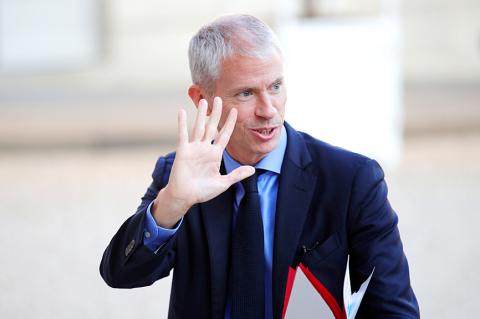French Minister of Culture Franck Riester urged people to cut down on their increasing use of English, in the latest effort to protect the French language, even though French President Emmanuel Macron himself often slips English idioms into his speech.
France has long been proud of its culture and language, and has constantly sought to defend it against the encroachment of the English language and the habits of the US, which are often dismissively referred to as “Les Anglo-Saxons.”
Riester made his plea to stick to French in a Twitter post published late on Sunday and marking the 25th anniversary of a law governing the use of French on television and radio.

Photo: Reuters
Critics yesterday rounded on his patriotic views, saying Macron regularly uses English idioms, such as the phrase “Start-Up Nation” to promote French innovation and technology, as do many of France’s top businesses.
“Macron himself uses Anglophone slogans!” Didier VanStaevel said, replying on Twitter to Riester, while others pointed to Macron having referred once to democracy as being a “bottom-up” system.
Cinema executive Christophe Courtois said that top French companies regularly use English slogans rather than French, such as Renault’s adverts titled “Never Too Much” and Air France’s “France Is In The Air” posters.
The 1994 Toubon law made the use of French mandatory in all TV broadcasts, meaning all foreign-language programs are dubbed, while radio stations must play at least 40 percent of French music for most of the day.
“The Loi Toubon is 25 years old! It’s the interpretation of article 2 of our Constitution — “The Language of the Republic is French.” Our daily lives would be so different without this simple demand — say things in French!” Riester wrote.
His tweet called for vigilance applying the law and was accompanied by a big picture of the country’s national flag, the “Tricolore.”
Ministry officials could not be immediately reached for further comment on the matter.
In 2006, then-French president Jacques Chirac walked out of an EU summit briefly as a form of protest, when the French head of the EU’s industry lobby addressed leaders of the bloc in English.

Kehinde Sanni spends his days smoothing out dents and repainting scratched bumpers in a modest autobody shop in Lagos. He has never left Nigeria, yet he speaks glowingly of Burkina Faso military leader Ibrahim Traore. “Nigeria needs someone like Ibrahim Traore of Burkina Faso. He is doing well for his country,” Sanni said. His admiration is shaped by a steady stream of viral videos, memes and social media posts — many misleading or outright false — portraying Traore as a fearless reformer who defied Western powers and reclaimed his country’s dignity. The Burkinabe strongman swept into power following a coup in September 2022

TRUMP EFFECT: The win capped one of the most dramatic turnarounds in Canadian political history after the Conservatives had led the Liberals by more than 20 points Canadian Prime Minister Mark Carney yesterday pledged to win US President Donald Trump’s trade war after winning Canada’s election and leading his Liberal Party to another term in power. Following a campaign dominated by Trump’s tariffs and annexation threats, Carney promised to chart “a new path forward” in a world “fundamentally changed” by a US that is newly hostile to free trade. “We are over the shock of the American betrayal, but we should never forget the lessons,” said Carney, who led the central banks of Canada and the UK before entering politics earlier this year. “We will win this trade war and

‘FRAGMENTING’: British politics have for a long time been dominated by the Labor Party and the Tories, but polls suggest that Reform now poses a significant challenge Hard-right upstarts Reform UK snatched a parliamentary seat from British Prime Minister Keir Starmer’s Labor Party yesterday in local elections that dealt a blow to the UK’s two establishment parties. Reform, led by anti-immigrant firebrand Nigel Farage, won the by-election in Runcorn and Helsby in northwest England by just six votes, as it picked up gains in other localities, including one mayoralty. The group’s strong showing continues momentum it built up at last year’s general election and appears to confirm a trend that the UK is entering an era of multi-party politics. “For the movement, for the party it’s a very, very big

‘BODIES EVERYWHERE’: The incident occurred at a Filipino festival celebrating an anti-colonial leader, with the driver described as a ‘lone suspect’ known to police Canadian police arrested a man on Saturday after a car plowed into a street party in the western Canadian city of Vancouver, killing a number of people. Authorities said the incident happened shortly after 8pm in Vancouver’s Sunset on Fraser neighborhood as members of the Filipino community gathered to celebrate Lapu Lapu Day. The festival, which commemorates a Filipino anti-colonial leader from the 16th century, falls this year on the weekend before Canada’s election. A 30-year-old local man was arrested at the scene, Vancouver police wrote on X. The driver was a “lone suspect” known to police, a police spokesperson told journalists at the